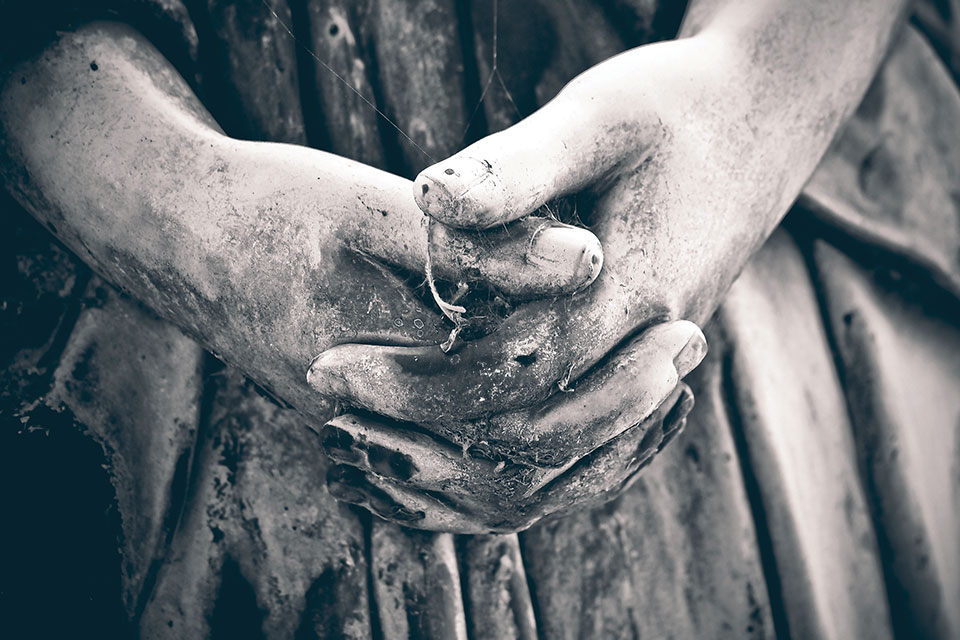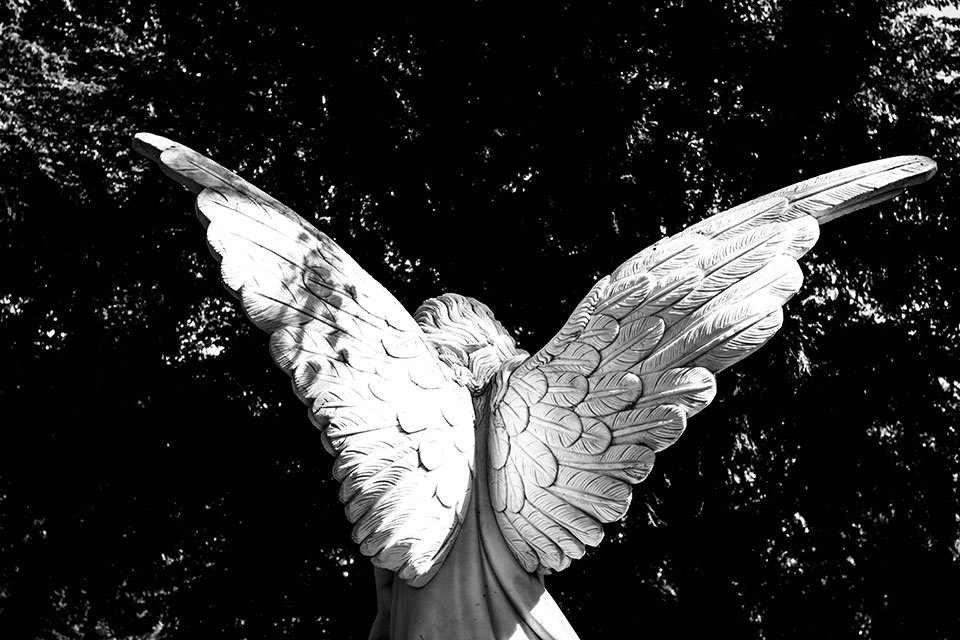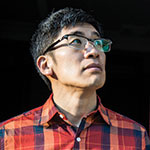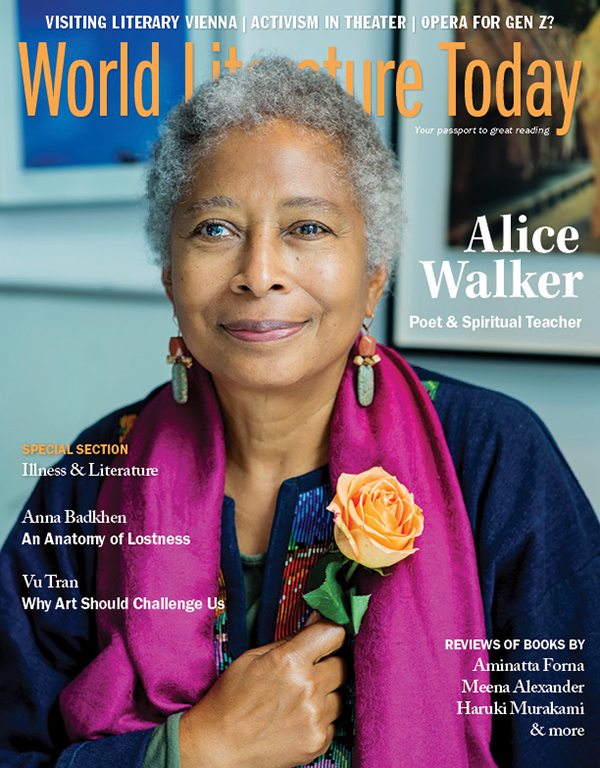Our Lady of the Scales

Following a hysterectomy, a woman is drawn to the gothic ambience of a stone statuary garden at her lover’s family’s home.
My third sleepless night in this room, listening to Gaël’s breathing, warm on the nape of my neck. His hand rests on my hip, a bit tense even in sleep. It won’t stray as far down as my belly. If I say something about it tomorrow morning, he’ll say he was trying not to touch the scar. Then he’ll change the subject. But what holds him back, really, is the fear of touching dead flesh—what might have been dead flesh, or might still be. Diseased flesh, scarred flesh. Or else fear of the emptiness I now bear inside me. He hasn’t gotten used to that yet.
Gaël was surprised when I asked to come back here. I’ve never really liked this house. The room we’re in belonged to his parents. I know the thought of sleeping here bothers him, but it was my idea. The walls in the guest room across the hall are too bright for my taste. And there’s an odd chemical smell, under the lingering whiffs of dust and mothballs, that catches in my throat. The yellow walls and the smell remind me too much of a hospital room.
I like this room more because of the old oaken furniture, the dark green wallpaper right out of an old library, the corners you just can’t rid of cobwebs. I feel comfortable here: this is the kind of atmosphere I need right now. Ever so slightly oppressive, stifling, and above all, out of the ordinary. Birdsong at night, rats scampering behind the walls, shutters slamming in the wind—all these sounds lull and soothe me more than silence. I’d love to play the heroine of a gothic novel and go down to the garden in my nightgown, a ray of moonlight piercing the dark, and stand on the cliff listening to the brewing storm. Wind-tossed hair, pale cheeks, and scarlet lips, nightgown billowing like the sail of a storm-tossed ship. From a distance, the villagers would catch sight of me, if any were still awake at this hour, and concoct legends of ghosts and white ladies. I’m in the mood for such things, haunted-house thrills. I want to go back to childhood sensations, scary stories whispered between siblings under the covers.
I feel comfortable here: this is the kind of atmosphere I need right now. Ever so slightly oppressive, stifling, and above all, out of the ordinary.
For that, though, I no doubt need more fears to fill the shadowy corners. I don’t have many left, but I try anyway—for fun. Even though the seas are calm and a dull stony gray, barely streaked with spray. Even if the bed doesn’t creak when I get up. Even if, instead of a ghostly nightgown, I leave the room in pajamas, slippers, and a parka.
When I push it off, Gaël’s hand doesn’t put up a fight, or try to hold me back. It slips softly to the hollow my body has left in the mattress, falling right through my absence without noticing. My body weighs so little now. Gaël barely stirs in his sleep; only that long lock of hair striping his cheek shifts a little. I leave him to his dreams. The garden awaits me.
The stairs scarcely let out a creak as I go down. I find my way easily through the gloom, pausing only to plug in the lights on the Christmas tree standing sheepishly in one corner. It’s a sad thing, a tree decked without an ounce of enthusiasm. The bulbs cast pink and yellow sparkles on the wrapped presents piled underneath. I’ve known merrier Christmases under this very roof. This is the first time we’ve come here alone, just the two of us: no uncles, cousins, or Gaël’s siblings.
The garden greets me with a welcoming breeze. Once through the door, I hear the muffled crash of waves in the distance. If you stand all the way at the far end of the garden, by the rusty gate, you can see the cliff’s edge and a few scattered houses. I usually like to stay right here, on the porch, or else in the grass—closer, at any rate, to the statues.
No one really knows who sculpted them. Some ancestor, according to Gaël; a neighbor, his brother Julien claims. The only thing everyone agrees on is that they’ve always been here. Lined up against the wooden fence, at first glance they look more out of place than a parade of garden gnomes. Then your eye gets used to them. You start studying them more closely, a bit surprised, gaze lingering. You take a second look to catch some detail or another that you missed a moment ago. It takes time to inspect them all: ten statues, four on either side of the garden, two by the gate.
Even when I didn’t enjoy being here at the house, I found their presence soothing. I needed that, last time. Tonight, as before, savoring the serenity here and now, I realize that the gothic frisson I’d been looking for earlier has slipped into the moment. Truly, the statues are a curious sight: a little corner of weirdness in the somewhat drab quiet of the village.
I walk out on the grass, which tickles my calves like a playful puppy. The stones seem to sigh for me. Probably just the wind, but I’d swear the statues were soothing me with their breath. A veritable balm, the sighs of stones. They welcomed me once, on a night of distress, and now they accept me as one of their own.
The pedestals are drowning in weeds, steeped in a layer of herbaceous surf. And, atop each one, a different figure. The artist had a gift for faces, if not postures. He made them static but expressive. Ten figures, frozen in serenity, unaware of what makes them different from one another. He endowed each one with animal or vegetable features, tempering whatever was human about them. Left of the gate, a man-tree hybrid reminds me of the metamorphoses of myth, Daphne become a laurel tree. Farther off, he carved a cat woman with velvety ears and half-bared claws. And third on my right: my angel.
The first time I saw it, its facial features caught my eye for some unknown reason. And then suddenly it was so obvious I had to laugh: the angel looked like me. Something about the way he smiled, his thick eyebrows. His hairline, perhaps. Just above the pedestal, the hem of his robe turns to tree roots well rooted in the rock. The skin of his temples, cheeks, and the backs of his hands are covered in tiny scales. As if his human disguise were torn in places, revealing an ophidian nature. An animal essence, but with a singular reptilian elegance. Sitting on the porch that first time, I stared at the statue in hopes of espying the transformation in action. How I would’ve loved to see him in full snakehood in the limpid moonlight: animal and angel all at once, my features plastered on a metamorphosing body.
When I got here the other night, I found him gaunter of cheek, his skeletal armature jutting more markedly from beneath his scales. He seemed to have lost some hair as well.
The last time we were here, I’d sought refuge in this garden, fleeing a family supper. The usual bickering, rehashing old memories, petty rumormongering; I hadn’t been able to stand it for long. So I came here, far from the voices I could still hear, muffled through the windows. I was in no mood for such things, all huddled up instead around my growing fear. Hints of a greater terror to come.
I was in no mood for such things, all huddled up instead around my growing fear. Hints of a greater terror to come.
We’d just gotten the diagnosis; Gaël hadn’t canceled our trip. Family matters to attend to, some business with an inheritance that was dragging on, a cousin he hadn’t seen in forever. A change of scene, Gaël said, would do us good. Give the news time to sink in. I think what scared him the most was the thought of spending those days alone with me and the darkness crouched deep in my belly.
He hadn’t yet summoned the courage to tell his brother, his sister-in-law, his cousins, that very simple thing: “Celia’s sick. She might die. And even if she doesn’t, if they have to operate, she may never be able to have children.”
I didn’t know much about cancer back then, just a few bits and pieces gleaned from TV or overheard in conversation. The doctor’s explanations. But I was about to learn more soon, more than I ever wanted to know. That emptiness to be filled frightened me more than all the knowledge in the world.
I’d seen, in Gaël’s eyes, a panicked fear beyond managing, the fear of a normal life turned abruptly upside down, without warning. No time to brace yourself. Things like this, his eyes said, only happened to older couples. Autumnal worries, for when our years together had already joined us in adversity. How to imagine mourning for a woman he wasn’t even sure he’d spend more than four or five years with? And deep in his eyes, behind the fear and the denial, a confession of guilt, for holding all this against me. Because no matter what, he’d need to see it through with me, to the end.
That night, back flat against the wall, arms clenched around my belly, nails digging into my elbows. Terror so burning hot it dried my tears. No pain yet, or at least not nearly as much as fear. But knowing that this was just the beginning, and seeing a chasm open at my feet . . . The thought of everything that awaited me, everything a human being could endure, pain and loneliness, the body wasting away. Death, maybe. And every step of the way, panicked fear, savage and debilitating. A newborn’s primal fear that reduces you to a howling animal.
All those doors, opening all at once, and me just waiting to see them slam shut right in my face. Long before I ever felt it, I pictured that malignant seed planted inside me, already corrupting my mind before moving on to my flesh. The creature had set to work. I could just sense it, when I paid attention. From deep inside came a shivering, a swarming, a tugging. A smothering. A crushing. How to get used to the idea that I bore within the seeds of my own mortality?
From deep inside came a shivering, a swarming, a tugging. A smothering. A crushing. How to get used to the idea that I bore within the seeds of my own mortality?
Every possibility fanned out before me, a crossroads. And that nagging little notion in my head: This is only the beginning. Not But I’m too young for this, or I’m afraid of pain. But the thought of everything to come. The effort it’d take, day after day, when I wasn’t even sure I had the necessary rage inside to keep up the struggle. Fear of giving up, of even more pain if I did. This is only the beginning. I didn’t want to have to fight.
The stone angel gazed upon me fondly, benevolently, wings folded neatly behind his back, but ever so slightly spread, as if about to unfurl. To beckon me into their welcoming embrace. A promise of consolation, were those heavy wings to close about me. Were that angel to lower his face to mine, its twin. As if he could halt the spread of that invisible beast inside me, already gnawing away at me beneath the surface.
I drew closer. I lay my head against the cold stone, and the angel did not move. But standing there in the garden, a thousand conflicting wishes rushed through my head. To freeze this moment forever. To make it so none of this ever happened. To fall into a slumber from which I might never wake.
Not to have to fight.
That night, I made a wish.
On a sudden impulse, because those statues reminded me of the ancient images in stone circles, with the immemorial fear tied to mysteries. All those superstitions, deeply rooted even today, that resurface as soon as we leave cities behind. I don’t really know what came over me. But just then, it seemed to spring straight from the source.
Beliefs persist in these parts. Probably because people adopt them the minute they set foot here, even if only for a brief stay. Passing before a small chapel of stone, you make the sign of the cross despite yourself, because you’ve exchanged glances with the Virgin and Child, and lowered your eyes.
Maybe it was the sight of the tableau they made, the ten of them, ever so serene. Or the flowers I’d gazed at in the garden, musing absurdly: Some of these plants will outlive me. Or the talon seizing my chest from inside. That night, I wished to become a wall. To see my illness fall away and leave me whole, human, my dignity intact. To refuse outright all those months to come. Time became elastic, every minute endless, every day over too soon.
Caressing the cold stone, I whispered, “Protect me.”
From deep down, a swarming. But the angel’s calm seemed to spread through me like a wave of warmth.
We build defenses. The more inhuman our ordeal, the more irrational they are. That’s what the people around me kept saying in the months that followed. While the creature settled into my belly, more present with each passing day.
Gaël had feared breakdowns, moments of despondency. He didn’t think he’d be a wall solid enough for me to lean on. Right from the start, his own insufficiency terrified him already. But I could tell it confused him to see me so at peace. No tears, no screaming—and their absence disturbed him. True, my flesh was howling, whittled away with a blade, but it was someone else’s flesh. Far away, the angel was no doubt weeping in my stead.
Sometimes, Gaël held this against me. Just a flash in his eye, glimpsed in passing, which he’d try to hide deep down inside. His own shame in no way changed things. He begrudged me an ordeal not directly his own. The chasm that fear had opened wide in a still shaky relationship. Things like this can bring people together. Or put up walls.
If my body is made of stone, disease can do nothing to harm it. I have petrified my will, rejected the fear that was about to render me inhuman, minuscule. I let stone overcome me, anesthetize my senses. Sometimes, I managed to keep the pain at bay. And then all my fear was gone.
In my hospital bed, I thought of the angel. I believe he came to see me sometimes, in my dreams. The barest shadow at the edge of my awareness, just before I sank into sleep. A reassuring presence. He watched over me from afar, from that garden. He’d planted a seed in me, a twin of the one eating me up from inside. Like a tree of stone growing in my flesh, branches reaching out along my every nerve, soothing and strengthening them all at once.
Tonight, in the garden, he looks like an ornament fallen from a Christmas tree, come to rest, by chance, in the tall grass. The golden star from atop the tree is the one now shining over the ocean. And the constellations are so many tiny lightbulbs. December, they say, is the season of miracles; I’ve gotten mine. Maybe. Evil has been vanquished, for a while. But there will be no child in the manger. Never again.
December, they say, is the season of miracles; I’ve gotten mine. Maybe. Evil has been vanquished, for a while. But there will be no child in the manger. Never again.
Month after month, doctor’s visits and treatments. Hospital walls. My cells ever more anarchic, more riotous. They had to open me up then, empty me out, sew me back up. They removed the tumor and everything around it. Sutured up the skin around that massive chasm. Hysterectomy. The very word itself is hideous.
Were they all carved from single blocks of stone, these statues? Or are they hollow inside, like me—no more than a sheath of flesh around a gaping void?
The others might be empty, but not my angel. Beneath my palm, pressed to the rough stone, I’d swear his belly has filled out since our last visit. Swollen, perhaps, with all the tears I never shed. The stone doesn’t feel as cold, unless it’s my fingers that have lost all their warmth.
He’s taken everything from me, that scaly angel of mine: my fear, my uncertainty, my wavering sanity. Maybe too—who knows?—the child I will never now bear. Whom I entrusted to him in an unspoken pact the night I made my wish. Brushing the cold stone with my fingertips, I hum an absent-minded lullaby, just in case. I want to feel something thrumming just under the surface. The angel will keep that baby for me, forever unborn. Genderless, but already named: Louise, or Lucas.

Odd, isn’t it—I never even wanted children. Never even wondered about it, really. Figured I’d always have time, that I wasn’t ready, that these things would simply happen in due course. I think I would’ve liked to feel my body fill out, to live for a while to the beating of two hearts. Instead, I nourished something else, something that made my decision for me. That emptied out
my flesh.
But not my mind.
Above his welcoming belly, the angel’s worn face, a stone mirror, reflects my own features. Shadows cling to the scales on his sunken cheeks: he looks more a reptile than ever. You rarely glimpse a glimmer of bone structure in statues, except maybe in religious figures: all those Christs on crosses, the St. Sebastians of the world. Not in nameless statues, a singular work modeled on a singular source. He watches over my own private chapel. He, I say, when I should be thinking she, since she is me, in part. Our Lady of the Scales, Our Mother of the Crab. St. Celia of the Hollowed Belly. Never shall be blessed the fruit of her womb.
The other statues have their stories, too. I can feel them on the brink of confiding them to me: I’m no doubt thick-skinned enough to be accepted as one of their own. At times it seems the wind whispers half-formed wishes in my ears. I’ve got time to spare: if they want to spill their secrets, they will. Unbeknownst to Gaël, I rummaged through the drawers looking for old photo albums. I’ve brought two into the garden and flipped through them cover to cover, sitting on the lawn at my angel’s feet. The blades of grass tickled me through my too-thin pajamas. Patiently, I studied all those bygone faces. I thought to recognize in the face of the cat woman the features of one of Gaël’s cousins who disappeared before she turned thirty. Other blurrier faces in yellowing snapshots seem to match the statues, echoes. I’m probably not the only one to have come here and made a pact with these stones. Others, too, shared these beliefs. It’s reassuring to know I’ll have company.
They say that what you live through makes you grow as a person. That may be what people who haven’t had to live through anything claim. Either that, or my stone armor has changed me more than I meant. What lesson should you be drawing from an experience that just leaves you a bit emptier inside? That’s all I’m left with, even behind my wall. An emptiness that can’t be filled inside a wrapper of flesh that only clumsily conceals it. And perhaps, still lurking in the corners, a few seeds of chaos awaiting their hour.
It could start up all over again. Gaël knows that as well as I do: he, too, has refrained from any rejoicing, lest it bring bad luck. Never forgetting the worst that could happen, so it won’t catch us by surprise. How to go back to regular everyday living, after that?
If I’m going to change again, I might as well get to choose what shape. Rather than this volatile flesh, so easily eroded, I prefer the silence of stone. To freeze forever that which still moves inside me. And become immutable at last. I want so badly to sleep. Not to wait, or to fight: just to sleep. I feel like the merest wind could sweep this carcass of mine, grown too light, from the ground, when all I dream of is weight.
Gaël was surprised to see me wearing gloves all day today. I blamed the chill in this roomy house, and he thought it a convalescent’s whim. I didn’t want him to see the stiffened fingers on my right hand, the skin grown rough at the fingertips. Already, I have trouble bending my arm. Good: I won’t have long to wait.
So every night, I go out and keep them company, my angel and the other statues I’m getting to know. Sometimes I walk all the way out to the cliff’s edge to listen to the waves. I’d like to be able to take that sound away with me. But one of these nights—soon, no doubt—I shall go down to the garden and take root. I shall grow branches, scales, perhaps even fur. And then, perched upon my pedestal, I shall fall at last into a mineral slumber.
Translation from the French












